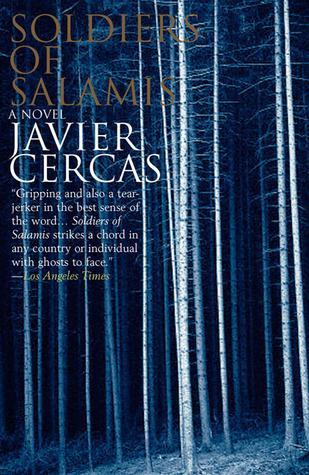(
)

THE READERLY RESONANCE CHAMBER PRESENTS
SOLDIERS OF SALAMIS
BY JAVIER CERCAS
Fiction that feels unlike fiction. Fiction that's partially about how
it's not fiction. Non-fictional fiction about writing, about war, about
endurance/persistence, about poets realizing their ideal worlds through
political action, about heroism, about historical reconstruction from fragments
as a creative act that keeps the dead alive, especially the dead who live
on in the words of people almost gone themselves. Structurally interesting
novel about a writer trying and failing to write fiction and backing into
this significant story through coincidences related to journalism, including
interviewing Roberto Bolano who's a major character in the third part of
this, a section that made what was an OK novel in the first part (about
the writer's discovery of the title story) and a pretty damn good novel
in the second half (the title story itself, essentially a biographical
essay on a Spanish fascist poet, sort of like Bolano's Nazi
Literature in the Americas but more accessible and more dramatic --
firing squad survival!) a pretty GREAT novel. Almost a few touching moments,
too, toward the end. A novel that, although it doesn't feel like a conventional
novel, excels thanks to its old-fashioned 45-degree angle narrative arc:
upwards, upwards, upwards, upwards until it reaches its long-sentence recapitulations
in its last pages, including the refrain onwards, onwards, onwards, ever
onwards. Worth it for the intelligence and honesty and the complex yet
clear semi-extravagance of the prose, for the approach, for the writing
insight ("a person doesn't write about what he wants to write but what
he's capable of writing about" or "a writer never writes about what he
knows, but precisely about what he doesn't know" or "To write novels you
don't need an imagination, Bolano said, just a memory. Novels are written
by combining recollections"), for the Spanish Civil War education, and
especially for the portrait of Bolano, including what's basically an interview
with him ("a man of action is frustrated writer; if Don Quijote had written
one single book of chivalry he never would have been Don Quijote") and
a drunkenly related tale about a WWII soldier's journey to Chad in Africa
and all the way back through Europe, a story reminescent of some of the
best parts of 2666 that
spurs the final section that makes this book, in the narrator's words,
"function." I probably read
the first 120 pages in too many sittings. Also didn't love the characterization
of the dippy girlfriend, and maybe thought repetitions of sentences in
the summation at the end seemed maybe a bit like high-literary hokiness?
But otherwise a really excellent, enjoyable, educational, interestingly
structured, serious yet never haughty novel that, best of all, felt to
me unlike a novel ("all good tales are true tales, at least for those who
read them"). Onwards and upwards!
From Bolano's Between
Parentheses: Essays, Articles, and Speeches, 1998-2003 about this
novel:
". . . there appears a character, someone by the name of Bolano, who
is a writer and a Chilean and lives in Blanes, but who isn't me, in the
same way that the narrator Cercas isn't Cercas, although both characters
are possible and even probable."
"His novel flirts with hybridization, with the 'relato real' or 'true
fiction' (which Cercas himself invented), with historical ficton, and with
hyper-objective fiction, though whenever he feels so inclined he has no
qualms about betraying these generic categories to slip toward poetry,
toward the epic without the slightest blush: in any direction, so long
as it's forward."
[Forever after at http://eyeshot.net/cercas.html]
Read more selections from the Readerly
Resonance Chamber
About
- Archive - Rejection
Letters - Gold Stars
- Recently
)
|
)

(
|